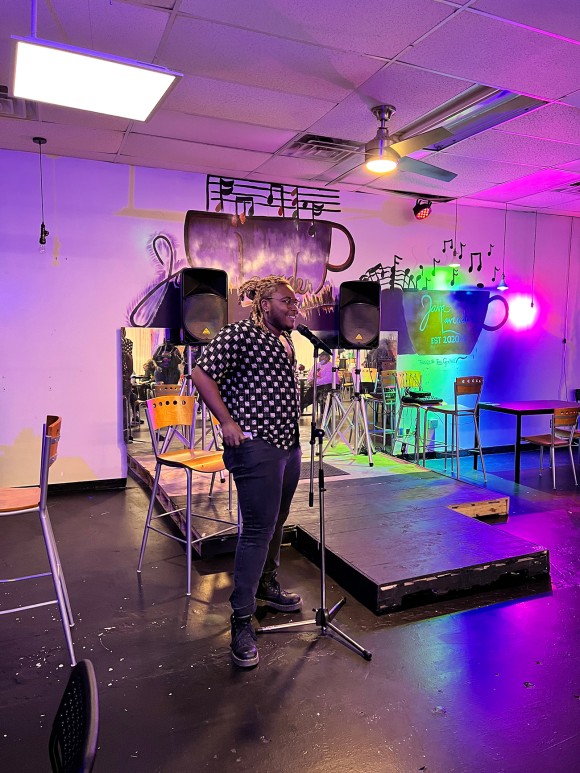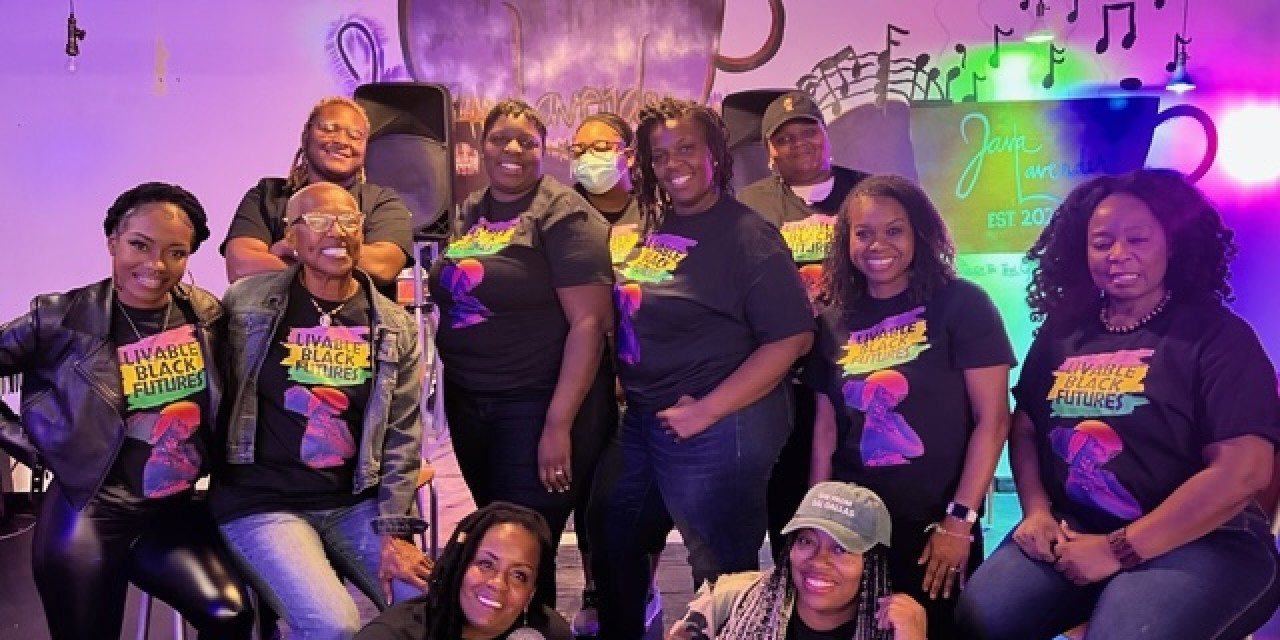Black maternal mortality in the United States is astonishingly high. According to a study published in the American Journal of Public Health, Black people are three times as likely to die during childbirth as their white counterparts, and traumatic experiences of pregnancy and childbirth are even more common. “Notes on Creating Livable Futures," is a collaborative humanities project that responds to the reproductive challenges that systemically impact Black women and womb holders. 1 Through story circles, programming, and engaged research that opens up space to imagine and enact livable black futures, a Texas-based team of scholars, doulas, and community organizers are working to support birthing people in healing from medical trauma.
The project was initiated by Stacie McCormick, an associate professor of English at Texas Christian University (TCU), and designed in collaboration with Marsha Jones and other members of the birth justice team at the Afiya Center, a Black reproductive justice organization serving black womxn and girls in Dallas, Texas. Driving this collaboration are two core components: uplifting the healing power of stories through creative and critical writing, oral storytelling, and performance; and using stories to promote research that informs policy conversations about reproductive healthcare in Texas.
Noting an absence in support structures for Black women to navigate and share their stories of medical trauma, McCormick connected with the Afiya Team to co-imagine what a livable future could look like in the context of Texas’ current reproductive healthcare landscape. “I wanted to talk about Black birth from their perspective,” McCormick noted, “because every perspective I was seeing was from medical doctors who were engaging in mother blame, or they were engaging in patient blame and other types of harmful language that wasn't getting to the stories of what people were experiencing in these spaces.” Across the initiative McCormick uses the language of “livable Black futures” intentionally: “In naming our experiences with gynecological violence and institutional medical racism, how do we imagine the possibilities of being and care that enable black futures?”
In 2021, McCormick received an ACLS/Mellon grant to develop the project, and McCormick and the birth justice team at the Afiya Center officially launched Notes on Creating Livable Futures in the Fall of 2021. The project began with four storytelling circle sessions hosted at the Afiya Center for people to share their reproductive journeys and continued in the spring with a second circle series with formerly incarcerated women who had been recruited to participate from local transitional housing and re-entry programs. During these sessions, Afiya Center birth justice team members, Allison Tomlinson, a trauma-informed social worker and professor at University of Texas at Arlington, and local creative writers led exercises in creative storytelling and poetry that helped people who had experienced reproductive trauma to tell their own stories and take collective ownership in voicing their experiences.
In the storytelling circles, participants shared birthing stories as well as personal histories with obstetric racism, gynecological care, abortion, and pregnancy loss. Considering that sharing experiences of medical trauma can be a vulnerable and sometimes retraumatizing task, creating a sense of trust and community solidarity was of utmost importance during all storytelling sessions. To establish this atmosphere of care and solidarity, the Afiya Center team leveraged their positions as both long-standing advocates for Black women and girls’ sexual and reproductive health in Texas and members of the community: “We are actually the folk that we serve,” birth justice full-spectrum doula Qiana Arnold explained. After some staff members of the Afiya Center shared their own stories with both incarceration and medical trauma, participants felt safe to share personal experiences as well. McCormick recalled the shift in tone that these moments brought: “it was amazing how our participants then opened up. The conversation just went in a whole different direction in terms of just people really deepening. Once they started talking, I realized why they hadn't been talking because what they've experienced is almost borderline unspeakable.” D'Andra Willis, the birth justice coordinator at the Afiya Center and a full spectrum doula as a part of their Southern Roots Doula Collective, remembered the importance of providing care once stories were shared. “We learned that mental health was a big priority, and having mental health experts in the space at those times was crucial. Because having to relive those experiences caused a lot of things to come up that we either suppressed, or never healed from, or learned that we never ever healed at all.”
A chronic lack of access to reproductive care in Texas, a lack of post-partum Medicaid coverage, rampant housing discrimination, a lack of access in certain communities to healthy food and hospitals, and a systemic overcriminalization of Black people create a reproductive environment that is nearly impossible to navigate. As McCormick noted, the storytelling circles gave participants creative outlets to share their experiences within the Texas reproductive environment and, consequently, access powerful forms of healing. “They could give a metaphor to their experience that would help them to talk about it in a way that felt like they weren't just reliving everything for us,” she explained, “So that creative part, people could enter the space in a way that not only allowed them to name their experience, but to even push the boundaries so that they could tap into another form of healing through creativity.”
To further educate and gather the local community around obstetric racism in the medical industry, the first story telling sessions as part of the Notes on Creating Livable Futures project culminated in a public showcase that included poetry readings, storytelling, and music at Java Lavender Lounge in Dallas. McCormick describes this final gathering, held around food and drinks, as a celebration that created an all encompassing joyful and supportive environment: “It was beautiful … we had some people who spit fire, some created poems, some people created letters to themselves, to their past self. Some people even wrote to providers, some people wrote quarters affirmation, just kind of building themselves up.”

Alongside the storytelling components, McCormick and the Afiya Center team are also collaborating on a research project that builds on the narratives surfaced during the story circle sessions. Arnold explained that the added research component required further maintenance of trust, given the historically harmful nature of academic research and data collection in black communities: “Keeping in mind that this is still a research project and historically, not just incarcerated people, but black folk period have experienced a lot of trauma and violence for institutions. They know that this is an institution gathering information, so it was a lot. We had to go through processes to get them comfortable enough so that we can still create healing, but also gather the information to create change.” Here, McCormick’s positionality as a Black researcher helped bridge the gap between the community the Afiya Center serves and the institutionalized nature of a research project.
Given this commitment to sensitivity, the project team structures their research and data collection around community needs, rather than institutional or academic needs. Research questions are driven by what the story circle participants’ have articulated that they want and need to know. For example, community members have suggested that the research team take up the question of abortion access more deeply, as well as how biases related to fatphobia and disability show up in the medical system. Birth justice doula Helen Zimba explained that the relationship between researcher and community deepens the trust for the project: “For us as a group not coming in, as authoritative in a ‘we're here to teach you’ way. But we're here to do things together.”
Although the research is community-driven, the presence of an academically trained researcher helped give tangible structure to the collaboration.The Afiya project team members explained that the partnership with McCormick allowed for important growth to the work they do. “When we are with women going through the lowest point in their life, we don’t think about research or gathering information” Willis noted, “But Dr. Stacie, with her training, puts a name to it and is able to capture important information because she looks at it from a different lens. So our partnership that we have has been amazing, because we now have some important information.” Indeed, the data collected through the research will help the Afiya Center advocate for patient centered policies around reproductive justice and health in Texas.
Just as developing trust and attending to the mental health needs of the participants was a core feature of the storytelling circles, attending to the participants’ basic material needs by providing childcare, food, and stipends to those who participate is integral to the project. McCormick explained that the attention to the logistics of providing participants what they need to participate often gets ignored in many academic projects, but is necessary to affirm mutual respect between researcher and participant. “Where academia can be so disembodied, the Afiya team was so careful and attentive to people's humanity. The premise for our research was always thinking about how black women and black people deserve care and support, and that we need to prioritize that when we're doing this research.”
Following the second story telling circle and the Dobbs Supreme Court ruling that overturned the constitutional right to abortion, Notes on Creating Livable Futures is in a transitional phase, moving with urgency into strategic planning for the post Dobbs legislative landscape. The Afiya Center will move into a larger building and will open a birth center in Dallas, and with the new changes the project team will continue their relationships with the participants of the first two storytelling circles. McCormick is also working with students and faculty at TCU to build out an infrastructure to support graduate students interested in training in community engaged methods and in working with communities upon graduation. “One of the things that this fellowship and opportunity has given me is that there are other valued points beyond a capitalist framework for the work you do.” McCormick explained, “We're more than what we produce, we're also the communities we build or that we engage with. We are the impacts that we make on people's lives. It might not show up in a peer reviewed article, but you've done something important.” McCormick is working with students to develop an academic practice that reflects these thoughts and that creates an applied research method that supports rather than extracts from communities. She emphasizes to students that her work with the Afiya Center is new, that she is working not as an expert, but as someone learning alongside her students on how to research with communities: “I'm working with students to try to get them to a place that re-frames how they think about their own intellectual growth, and what they end up ultimately doing in the world with their knowledge. We are in a moment where people are really thinking through what research looks like from people who are connected deeply to these communities, and who are invested in ways that we haven't done before—a kind of research reparations.”
December 2022
